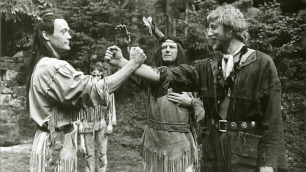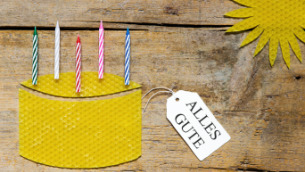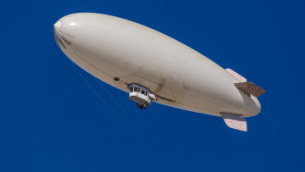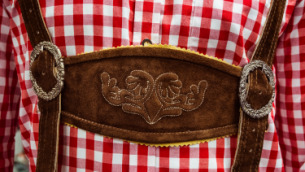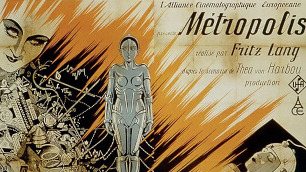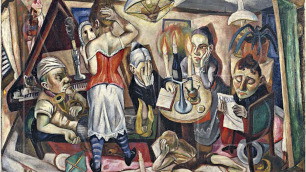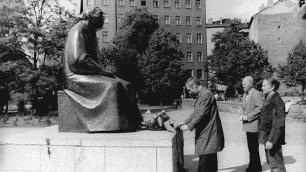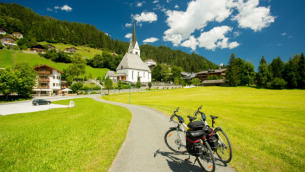| Jana: | Hallo Michael, willkommen zurück. Welcome back to our program! |
| Michael: | Guten Tag! I’m glad to be here, too. I hope our listeners are ready for another fun conversation where we’re learning without even noticing it. |
| Jana: | Danke! That’s a great way to start. We have already learned quite a few things, mainly verbs and how they function. Now we have a topic that may seem simple, but actually has a unique variant in German: articles. |
| Michael: | Ja! We are unique, indeed. And we love to go against the grain. |
| Jana: | I think I know why you say that… The use of articles in German is very different compared to other languages. |
| Michael: | Exactly! My favorite example is the sun and moon which are usually the same gender in all the Romance languages: The moon is female and the sun is male. But of course, the Germans chose the opposite! I think it’s because they believed the sun was a female God. |
| Jana: | That’s interesting. You’re right, in German we say: die Sonne und der Mond. The article die is female and der is male, but is the sun a feminine object? It seems these articles are associated with lots of items without giving them a feminine or masculine character. For instance the fork, die Gabel. It’s still a neutral thing but has a female article. Der Löffel, the spoon, is no different in that way. |
| Michael: | And because Germans just have to be unique, they added one more gender called the neuter, which is neither male nor female. Das Haus. Das Glas. Das Land. |
| Jana: | Great examples! These are easy for our listeners to get. And indeed, most languages have 2 articles, but the Germans had to have 3! |
| Michael: | I know people might feel overwhelmed by that… To everyone listening, don’t give up! We have simply reached the Autobahn! |
| Jana: | Well, not really, we will definitely not speed up! But shall we lighten things up with a little song? “Der die das, wer wie was, wieso weshalb warum, wer nicht fragt bleibt dumm.” |
| Michael: | Der die das, wer wiewas, wieso weshalb warum, wer nicht fragt bleibt dumm! This song brings back memories from when I was in kindergarten! There are a lot of new words here, but the song encourages you to ask questions to be able to learn and get smarter. |
| Jana: | Richtig! Der die das rhymes with wer wie was – words we use to ask questions – but we will get to those later. And the good news is that when it comes to learning these random articles, there are some hacks! |
| Michael: | Ja? There are? |
| Jana: | OK, for instance job titles are mostly male. Der Polizist, the policeman, der Politiker, the politician. |
| Michael: | Wunderbar! And if the person is female, there is a simple rule to make sure women are represented, too: You change the ending by adding “in”. So the word Polizistin lets you know it’s a female cop. Here are some more examples: die Politikerin, die Pianistin, die Journalistin. |
| Jana: | Richtig. Just a little side note, sometimes the vowel changes: der Arzt, the doctor becomes die Ärztin. |
| Michael: | OK, are there any hacks for das? Das Auto. Oh wait, I think I see a pattern for things that move: das Schiff, the ship, das Flugzeug, the plane, das Fahrrad, the bicycle! |
| Jana: | Gut! I know we’ve talked about how much we love cars. Just remember when you refer to the actual brand, it becomes der BMW, der Audi, der Porsche, der Mercedes. |
| Michael: | Sehr gut. Anything else that helps? |
| Jana: | Yes, again, paying attention to the endings helps: -chen turns anything into a neuter small version of the subject. Das Haus, das Häuschen, der Mann, das Männchen. |
| Michael: | Ah, but here is a controversial one: das Mädchen! When we talk about girls, we might refer to someone between 0 and 16, right? Regardless, the word doesn't have a female article! |
| Jana: | I know, it’s really strange that it has stayed despite the feminist movement, and I wonder if one day they will change that. Just like no one really says das Fräulein anymore, which is now recognized as a belittling way to address a woman. |
| Michael: | Very true. OK, I’m curious, if there are more tricks looking at endings? |
| Jana: | Yes, for Latin words ending in -tion, which we see in the news quite a bit, you can count on them being female. Die Nation, die Konstruktion, die Kommunikation, die Mission, die Fiktion, die Aktion… |
| Michael: | Okay, okay… We get the idea! |
| Jana: | Also, words ending in -ung, like die Zeitung, the journal, die Leistung, the achievement. |
| Michael: | Die Morddrohung! The death threat! |
| Jana: | Michael, I know we are using words from the news but please let’s try and stay positive! |
| Michael: | I never paid attention to these patterns… I thought the way we apply articles was completely random, or even to purposely confuse people! |
| Jana: | Do you want more? The ending -heit is always female, too! Die Freiheit, freedom, die Sicherheit, safety, die Mehrheit, majority, die Minderheit, minority, die Gesundheit, health, die… |
| Michael: | Frechheit! |
| Jana: | Oh yes, that one often comes in handy. It means impudence, and like you just did, it can be used as a remark during a conversation. |
| Michael: | I bet the ending -keit is also feminine: die Einigkeit, unity, die Möglichkeit, the possibility. |
| Jana: | Sehr gut! Hopefully, this helps our listeners feel assured that they will be able to master this! But for some other words without a telltale ending, like die Familie, die Energie, you will only learn the matching article if you keep practicing them. By using repetition you can develop a feeling for it with time. |
| Michael: | Aw come on, repetition? No one likes that. I thought the name of this show was G.U.T.S.: Get Up To Speed?! You gotta go with your gut instinct, and something is telling me now that a lot of German words are feminine, am I right? |
| Jana: | I guess you could say that, when in doubt, just try to go with a feminine article, as 46 percent of German words will be die, 34 percent der, and 20 percent das. |
| Michael: | Not fair! Are there any more tips that we know of that will always indicate the male article? |
| Jana: | Ja! Der Tag, der Morgen, der Abend, and all seasons: der Sommer, der Herbst, der Winter, der Frühling! Oh and Latin endings like -ismus, present you with familiar words such as der Kommunismus, der Rassismus, der Sexismus… speaking of which, I think it’s a nice discovery that our language doesn’t necessarily mirror our male dominated world… Language informs the way we think, and maybe that is one reason why German is so poetic. |
| Michael: | Point taken. Hey, what about die Nachrichten? |
| Jana: | Ja, thanks for mentioning the plural article, which is always die, as we know from die Nachrichten. Some are really easy to understand: die Kinder, but the plural endings can vary, just like in English. |
| Michael: | Let’s go with an easy one, adding an -s, as we have in cars. Das Auto becomes die Autos when there are several. |
| Jana: | Good one. And sometimes we just add an -n, die Energie, die Energien. |
| Michael: | And some stay the same when the ending is in -er, der Computer, die Computer, der Helfer, die Helfer. The helper and helpers! |
| Jana: | Great examples, -er is also a plural ending for das Geld, money, die Gelder, the funds. |
| Michael: | OK, there are a couple of others but we covered so much today, I think we should stop here. |
| Jana: | Gut, wir beenden die Lektion. Just a reminder that looking at this episode’s corresponding grammar lesson will help deepen what you learned today. |
| Michael: | And don't forget the quiz. Oh, das Quiz! |
| Jana: | Super! Auf Wiedersehen! |
| Michael: | Tschüss! |





